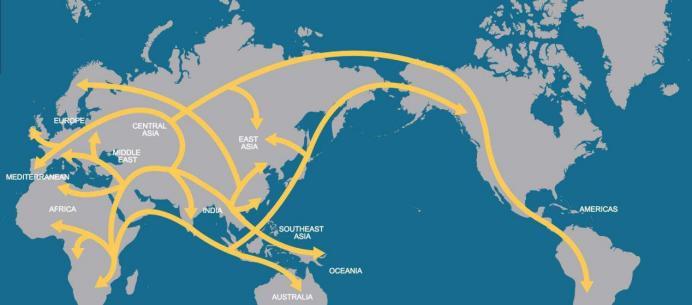200,000 years ago, the first ancient humans out of Africa were discovered, and it was not easy to see how early ancestors were
Review - Small text
Geologists have investigated rock formations in the Middle East and found that the Earth was once caught in an ice age about 200,000 years ago. Many archaeological studies have found that the large-scale migration of humans out of Africa followed this event, so the archaeological community has always believed that the Ice Age stopped our ancestors from moving out of Africa.

However, according to the News of Science and Technology Daily on July 1, Riool Wesbrod, a researcher at the Israel Antiquities Administration, and others published a study related to humanity's departure from Africa in the journal Human Evolution. The report notes that humanity may not have been able to move out of Africa, as conventionally assumed, and was held back by ice ages. On the contrary, our ancestors may have walked out of Africa during the Ice Age. So why did humanity go out of Africa? How did the researchers get the findings?
Why did humanity go out of Africa?
Paleoanthropologists have found that there have been transitional stages in the body structure of ancient humans in some periods, and ancient human fossils that are still on the African continent have appeared to act with limbs on trees to hind limbs on the ground. The reason for this phenomenon is that paleoanthropologists believe that extreme climate and weather have led to the degradation of large areas of forests on the African continent into shrubs or grasslands, forcing most of the ancient humans to live in trees.
Therefore, the first ancient humans who walked upright on the ground were born in Africa, but they also failed to stay on this native continent for a long time, with the continuous expansion of the ancient human population, coupled with the degradation of the natural environment in Africa day by day, in order to survive the ancient humans had to risk the migration of the family, so a great migration from Africa to Asia, Europe, and Oceania began.
How do researchers confirm that humans have already left Africa during the Ice Age?
According to Riol and other researchers in the study, they found fossils of ancient humans dating back about 200,000 years in a cave called "Mislia" in northern Israel, and it should be the first fossil to be found out of the African continent, if nothing else.
In addition, the research team also found as many as 13 animal fossils in the same cave, and after comparative analysis, these animals are more similar in body structure to animals living in alpine areas, which shows that there was also a cold climate in northern Israel at that time, which confirms the existence of ice age. In summary, the harsh environmental conditions of the Ice Age did not deter the emigration of African archaeopterans, and judging from the archaeological situation of the caves, they seem to have overcome the climatic difficulties of that period.
In addition, humans may know more about seafood than we know
Some time ago, foreign research teams also made new discoveries in the Middle East, changing some of the perceptions of modern Homo sapiens about their ancestors. The team found a large number of shellfish remains in the Red Sea region, alongside some human skeletons, suggesting that the connection between humans and seafood may have been much earlier than we thought.
In recent years, the archaeological community has made many new discoveries in excavating the history of human development, which not only shows that we are constantly learning about the past of our species, but also reveals the "history of human beings" on the earth.